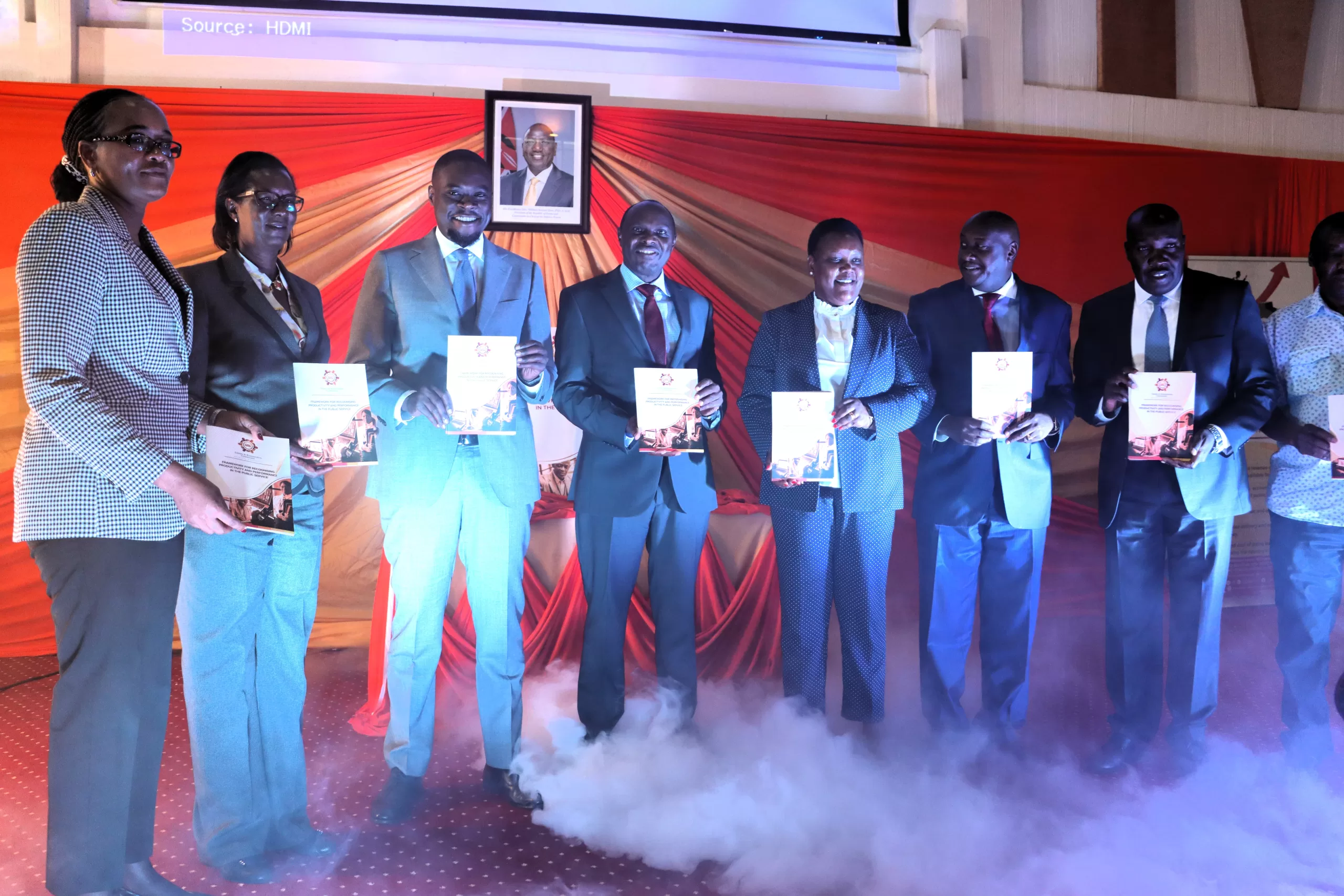- +254 (20) 2710051/71/73/75/81 or (0)736 712 864
- info@src.go.ke
- Rewarding Productivity
Launch of Framework for Recognising Productivity and Performance in the Public Service
September 25, 2023 | 5:52 pm
Guided by the principle of recognising productivity and performance, the Salaries and Remuneration Commission (SRC) launched the Framework for Recognising Productivity and Performance in the Public Service, on 14 April 2023, at the Kenya School of Government (KSG).
The launch was officiated by Felix Koskei, Chief of Staff and Head of Public Service, in the presence of Lyn Mengich, SRC Chairperson, and other high level dignitaries.
While giving his remarks, Hon. Koskei observed that productivity and performance were key issues directly linked to the country’s national goals. He stated that many of the challenges facing the country could be addressed by improving productivity.
He urged public servants to wake up to its role in society and be accountable to the citizens who have entrusted them with the management of their affairs. Further, he declared his full support towards the implementation of the Framework in the entire public service, and undertook to facilitate a retreat for the sensitisation of public service institutions.
On behalf of SRC, Mengich emphasised that public service productivity was a transformative agenda that would enable the government to drive and align the entire public service towards competitiveness, high and sustained revenue growth, improved service delivery, increased profitability, and improved remuneration.
She said whereas organisational success thrives on higher productivity, employees became more productive when they are recognised for their contribution, hence, the need for the Framework.
Other high-level dignitaries present at the launch included, Hon. Johnson Sakaja, Governor, Nairobi County; Hon. Florence Bore, Cabinet Secretary, Ministry of Labour and Social Protection; and Amos N. Gathecha, Principal Secretary, Ministry of Public Service, Gender, and Affirmative Action, among others representing various public and private institutions.
In her remarks, Hon. Bore called upon the public service to embrace the Framework for improved service delivery to citizens. She avowed to champion and lobby for funding and staffing of the National Productivity and Competitiveness Centre (NPCC).
On his part, Hon. Sakaja said the Framework would be used to manage resources tightly, build and keep public trust, as well as attract and retain talent. He enthused that the Framework would now be available at county level, which would enable each county to commence its implementation.
Further, the governor noted that the Framework was welcome since it would build on performance contracting data and illuminate the path to improving it.
The objectives of the Framework are; linking financial rewards to measurable productivity and performance; reviewing and setting financial rewards for State officers in recognition of productivity and performance; and seeking SRC’s advice on financial rewards for all other public officers in recognition of productivity and performance.
In additional, the rationale for the Framework are; lower wage bill to revenue ratio, and thus, more resources available for development; enhanced cost efficiency, accountability, and efficient utilisation of public resources; improved revenue and economic growth; improved service delivery and enhanced value for money; and reduced cost of doing business, thereby, increasing the country’s competitiveness.
As per the Framework, the pre-requisites for enjoying productivity and performance-based rewards require that a public institution achieves at least 101 per cent of the annual performance ratings, and improves productivity index.
Others pre-requisites are; demonstrates cost efficiency, growth in revenue and profit (for commercial and revenue-generating State corporations); makes the necessary budgetary provision for the productivity and performance-based bonus; and submits to SRC a proposal on the productivity and performance-based bonus. Employees should also achieve at least 101 per cent performance rating.
Further, the productivity and performance-based bonus shall be prorated based on corporate score and be anchored on the basic salary of State officers, other public officers, or the accounting officers in the case of board members.
During the auspicious occasion, presentations were made by the Kenya School of Government, as well as from institutions that piloted the Framework, such as the Ministry of Health, KenGen, NPCC and Tana River County Government.
An online portal has been developed to automate the process of submission of documents/information by public service institutions. The portal can be accessed through SRC’s website on https://www.src.go.ke.
Select Latest News and Events to view
The Third National Wage Bill Conference (NWBC)
Question-and-answer session on revenue and wage bill management – Day 2
Third National Wage Bill Conference Day 2
The 3rd National Wage Bill Conference
CAPACITY BUILDING ON PRODUCTIVITY MEASUREMENT
GETTING TECH SAVVY: SRC ROLLS OUT AUTOMATED WAGE BILL MONITORING INFORMATION SYSTEM
Executive and CCIOs adopt joint resolution on closer collaboration
Extending partnerships into the civil society world
Going Live on Kitwek FM
Outlining SRC’s mandate on Mulembe FM
Stagnation in the public service
All in a day’s work: Part-time versus full-time
Insight into the remuneration of health workers in the public service
Launch of Framework for Recognising Productivity and Performance in the Public Service
Hon. Justin Bedan Njoka Muturi, EGH
Skip to content
